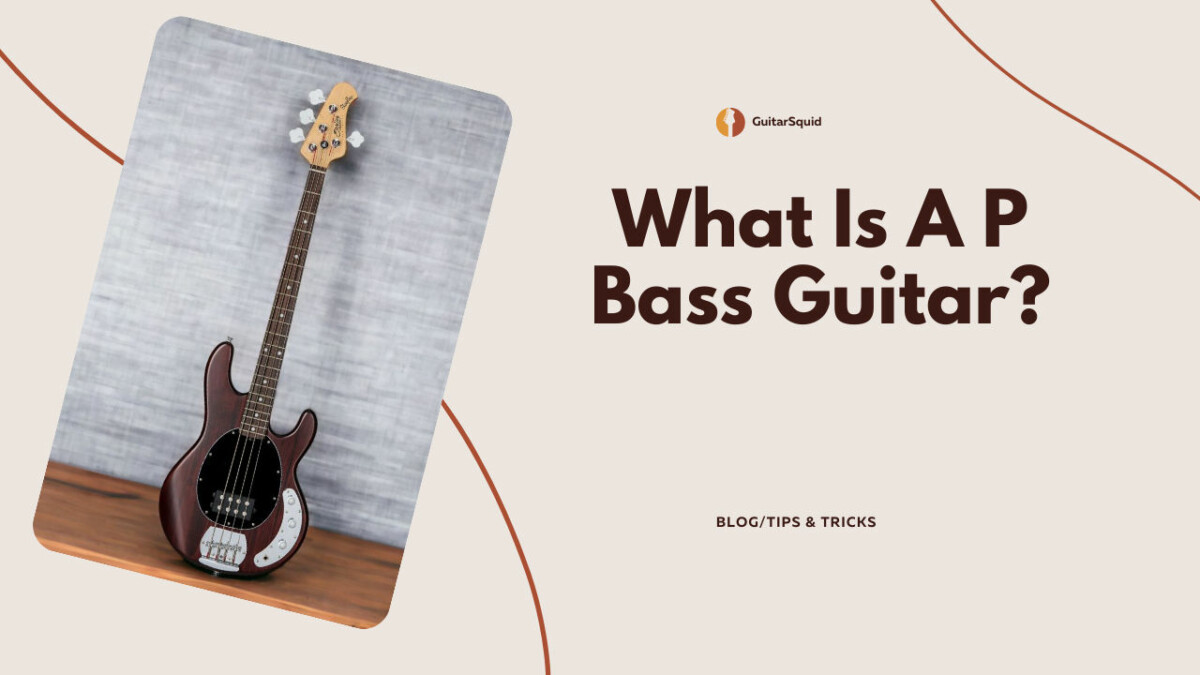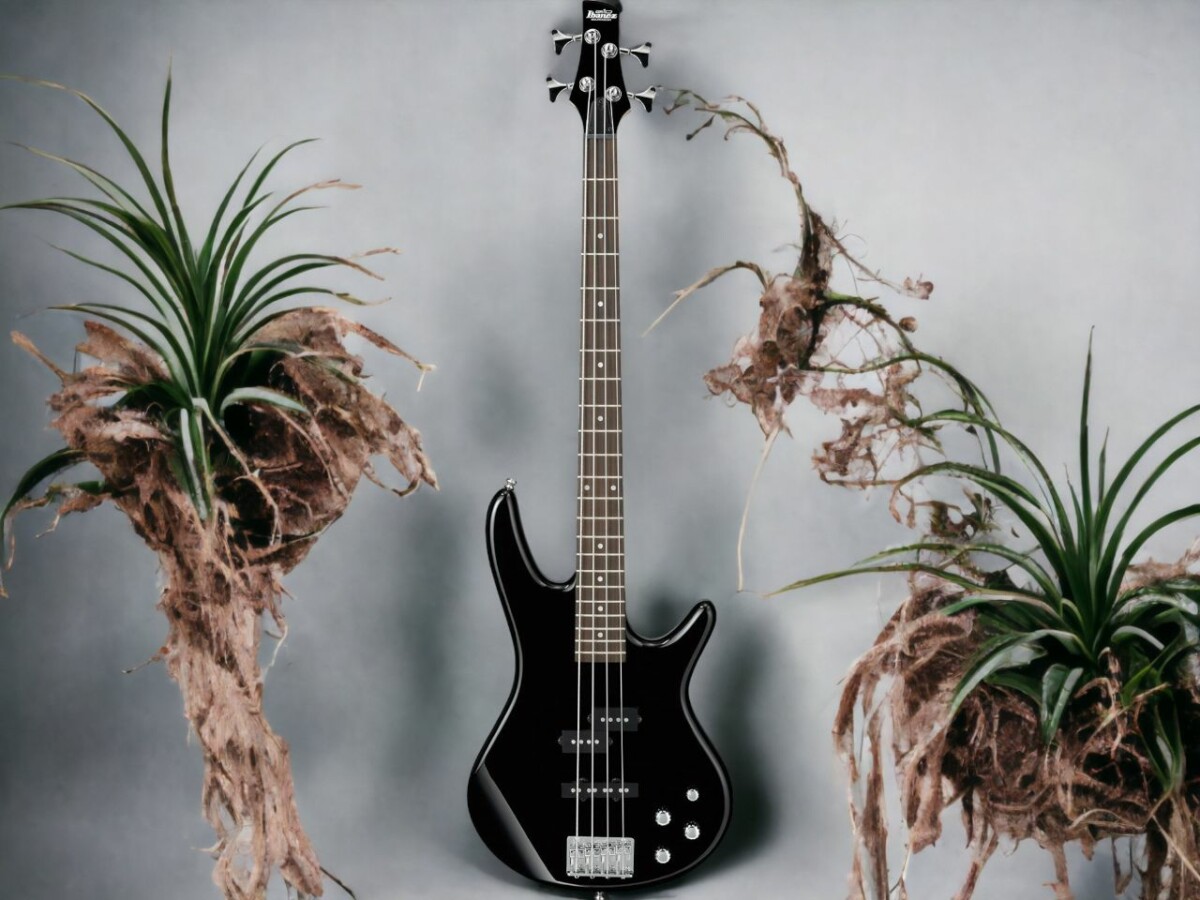So, you’ve probably come across the term ‘P Bass’ and thought, ‘What’s the big deal?’ Well, as a bass lover, get ready to have the veil lifted on this legendary musical tool.
The ‘P Bass’, a nickname for Fender’s Precision Bass – the first ever bass guitar to be mass-produced, is an impressive mix of accuracy and might.
So, tighten those strings, make yourself comfortable, and let’s delve into the fascinating realm of the ‘P Bass’, its standout sound, and why it continues to be a fan favorite even today.
The Origin and Design of the P Bass Guitar
A P Bass, officially named the Fender Precision Bass, first popped up on the scene back in 1951 thanks to Fender, claiming its fame as the first-ever electric bass guitar to gain major attention and usage. This trendsetter nudged out the traditional upright double bass in the hot seat of popular music. Best known for its deep, resonant tone that has a real roundness to it, the P Bass is a crowd-pleaser in nearly every corner of the music world, from rock to jazz, punk and everything in between.
Ever been curious about how the P Bass guitar came to be? This beast was the first of its kind to be mass-produced by the legends over at Fender. By the way, if you’re wondering are Fender bass guitars good, there’s plenty of debate on that topic. It’s not just a cool design that popped up in the 1950s – the P Bass has transformed over time to suit the needs and tastes of the musicians who love it. Big names like James Jamerson and Carol Kaye were all about that P Bass life, using it to create their signature sounds.
There’s something special about the P Bass, right? It’s got this bold, punchy tone that’s just unmatched, and the fretted neck gives players precision like nothing else. But it’s not just about the sound, the design has evolved too. The body shape, neck profile, and electronics have all been tweaked over time, but without losing those key features that make it a P Bass.
And even with all the changes, the P Bass is still loved by the greats. It’s more than just a guitar, it’s a piece of music history that’s not going anywhere. So here’s to the P Bass, a timeless classic that’s still turning heads and making waves in the music world.
The Importance of Frets in Precision Basses
So, you’re on a mission to get to grips with the P Bass guitar, huh? Well, you can’t ignore the importance of those little guys – the frets. These dudes are key players when it comes to the sound quality, playability, and overall performance. Let’s break down why fretted bass guitars rock:
- Precision: Frets are like your own personal cheat sheet. They show you exactly where to park your fingers for spot-on note playing. If you’re just beginning your musical journey, fret not (pun intended). Did you know that you can learn bass guitar at 50? Age is but a number!
- Sound: Frets are the secret sauce giving P Bass guitars that unique, bright tone that everyone recognizes.
- Learning curve: Frets are like training wheels for those just starting on their bass journey.
But hey, music is always changing – and so is the bass guitar. Enter: the fretless bass. This newcomer serves up a smoother, more chill tone. But don’t count out the P Bass just yet. Its frets give it some pretty cool perks that keep it standing strong in the game.
P Bass and Precision-Style Basses: A Comparison
Diving into the world of P Bass guitars is a thrilling ride. But hey, let’s not forget about their cool cousins – the Precision-style basses. Getting to know both these types will help you truly understand the whole bass guitar scene.
Sure, P Bass and Precision-style basses share some design similarities, but when it comes to their sound, they’re like night and day.
Now, let’s chat about P Bass versus Jazz Bass. When it comes to their sound, P Bass rocks a punchier, more intense tone, thanks to its split-coil pickup. On the other hand, Jazz Bass belts out a smoother, more mellow sound. It’s a must to have the right equipment, as there’s a common misconception that using the wrong gear can lead to issues. For example, have you ever wondered can a bass guitar damage a guitar amp? It’s something to be aware of as you dive deeper into the world of bass guitars.
Bigwig musicians like Sting and Roger Waters are all about that P Bass life, totally vibing with its strong, crystal clear tone. But remember, at the end of the day, it’s all about what you dig. Pick the bass that matches your style and the sound you want to put out into the world.
Understanding J Bass and P-J Style Bass Guitars
Alright, we’re about to dive headfirst into the crazy cool universe of J Bass and P-J style bass guitars. These bad boys are responsible for that distinct sound that forms the core of countless legendary tracks. Let’s break it down:
- J Bass: This one’s all about its twin single-coil pickups, delivering a vibrant yet full-bodied tone that’s hard to ignore. The variety of pickup combinations on a J Bass gives you an insane amount of tonal options to play around with.
- P-J Style Bass Guitars: Talk about getting the best of both worlds! These hybrid beasts marry the precision of P Bass and the jazziness of J Bass. The real game changer with P-J style bass guitars is their dual pickups. You get to switch between that hard-hitting P Bass tone and the silky smooth J Bass sound like a boss.
- Unique Pickup Arrangements: The magic of P-J basses lies in their ability to blend two completely different tones, adding a whole new layer of richness and variety to your tunes.
Decoding the Light-hearted Banter: The Name ‘P Bass’ Explained
So, you’ve probably come across the term ‘P Bass’ a few times in your chats with fellow music lovers, right? Let’s cut to the chase and dive into what it really stands for.
The ‘P’ here is all about Precision – a term that’s got a pretty deep history in the music world. Fender, the legendary music brand, named their first-ever mass-produced bass guitar as ‘Precision Bass’. This was their hat-tip to the instrument’s fretted neck that made playing it so much more accurate and, well, precise.
This innovation was a total game-changer, opening up the world of bass playing to a whole new crowd of musicians. And the impact of the P Bass on mainstream music? It’s massive. Whether it’s jazz, rock, country, or pop – you name it, and the P Bass has likely played a role in shaping the tunes we all love.
It’s pretty clear why the term ‘P Bass’ is worn like a badge of honor in the music industry.




